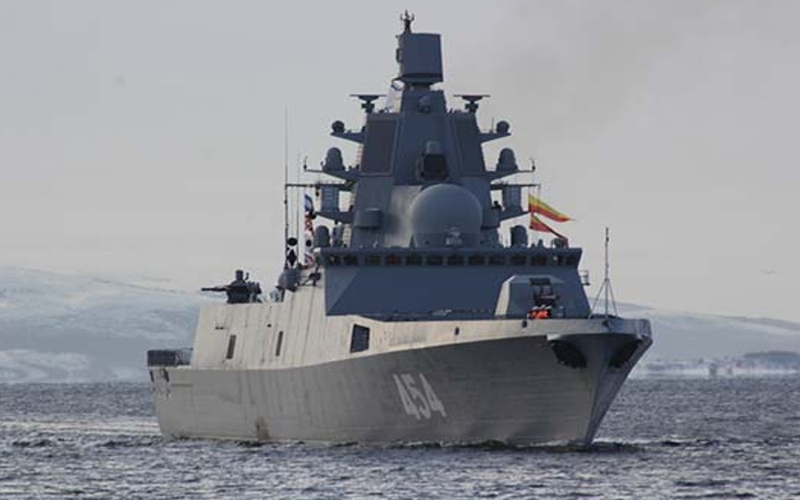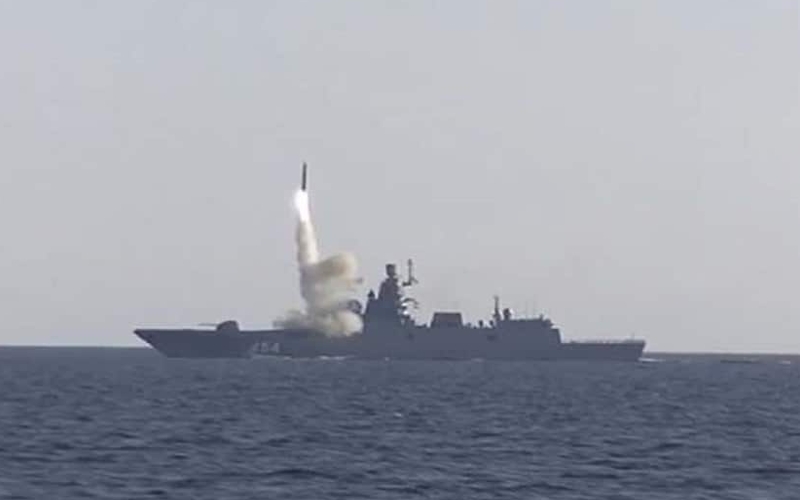The sovereign nations of South Africa, Russia and China took part in combined Naval Exercises from the 21st to the 27th of February where units from their National Navies jointly co-operated in a number of fields. The emphasis in the media on the fields differed according to whether or not the spokesperson/narrator had an agenda to follow or whether they were one of the participants. The 3 nations taking part were quite clear that the exercises involved 12 drills including anti-piracy measures, air defence, maintaining maritime security which involved greater cooperative interfacing and also involved procedures like landing by Helicopter on each other’s vessels. China sent a destroyer, a frigate and a support ship, South Africa was represented by a Frigate and two support ships, and Russia deployed a Frigate and a tanker. In essence, it was like many other military drills or exercises held in different parts of the world by various nations together and in the case of the USA and its allies, held as a show of raw power. The unending howling by the MSM western media (Japan included) that these quite boringly mundane exercises implemented to increase efficiency and increase the amount practical experiential data which further enables greater effectiveness did not cease for a good 10 + days. Western country’s media have hyped the exercise as "controversial" claiming as the reasoning behind this stance theTaiwan question, the Russia-Ukraine conflict and of course, South Africa's refusal to condemn and impose sanctions on Russia. Then another opportunity to play the geopolitical game arrived to replace it in the top items of ‘important’ news.

According to themajority of western media, the real reason for the naval exercises taking place was that China and Russia wanted to destabilise the African Continent and turn it towards themselves for commercial, economic and political reasons. It was all part of the plot to wrest control of Africa’s resources from western companies (read governments) and stifle the western economies so gaining power and controlling the world. There was no such outcry in November 2019when the first joint maritime exercise involving naval forces from China, Russia and South Africa took place in Cape Town with 7 ships (1 warship from each nation, refueling ships and survey ships) when they practiced dealing with coastal fires and floods, and retaking ships from pirates.
The outbursts also involved South African media and politicians who took clear positions regarding the whole affair with the added emphasis of the ‘internal’ political landscape of South Africa and the impending elections overshadowing the issue. In most of the blurb emanating from the west, the economic issues were raised with a lot being made of it being a ‘propaganda’ victory for Russia and/or China both in respect of their military prowess as well as their economic might.

Voice of America stated that it was a deliberately ‘less about a real exchange of military prowess and more about important political and diplomatic optics’. It quoted experts, Paul Nantulya, from the Africa Center for Strategic Studies in Washington and Priyal Singh, a senior researcher at the Institute for Security Studies (ISS) in Pretoria while Singh’s colleague Denys Reva stated “I believe that the decision to proceed with these exercises was primarily driven by political considerations. Navies play important diplomatic and symbolic roles." The article expanded the western point of view to include China looking to expand the possibility of other Naval bases in Africa in order to protect its investments and nationals in Africa as well as the shipping routes so vital in transporting the goods quoting Steve Tsang the director of the China Institute at SOAS in London among others. Little was made of the purely practical aspects of the drills.
The press in Japan went to town with the subject in the Ashai Shimbun South Africa’s naval exercise with Russia, The tone of the article was alarmist focusing on Russia and the Ukraine Crisis and China’s stand on Taiwan and stating that it raised tensions globally sending out very worrying signals that Russia and China were flexing their respective and collaborative muscles as global military powers. Again the quotes from ‘experts’ like Steve Gruzd from the South African Institute of International Affairs appeared “These exercises are going to be a lightning rod,” which implies much but means what exactly ? According to the Ashai Shimbun , South African Diplomats from 6 EU countries condemned the exercises but no data or proof was given, other than the source was Reuters as if that was sufficient. It then went into the history of Africa’s involvement with Russia and China and pushed the economic narrative stating that it was not in South Africa’s interest to imperil its trade with the EU, its largest trading partner or ‘western’ investors (none of whom are or have been lining up in droves).It even quoted Kobus Marais, head of the Democratic Alliance’s defense portfolio as stating ‘It is a slap in the face of our trading partners to be this clearly on the side of Russia on the anniversary of the invasion’ to highlight the political division inside the country ending with ‘We’re the useful idiots.’
The BBC naturally hyped up the affair from the political perspective with quotes from the ‘opposition’ (unnamed) stating it was tantamount to South Africa backing Putin’s ‘invasion’ of Ukraine giving the western version of events as opposed to the 8 years of relentless killing of Russian speakers in the Donbass by Ukrainian Military forces which led to Russia entering Ukraine to protect Ethnic Russian speaking Ukrainians from genocide. The USA as usual was upset. They quoted Denys Revaof South Africa's Institute for Security Studiesas saying ‘Moscow will be trying to show that despite its setbacks in the war in Ukraine, its armed forces are still very powerful’ which is interesting given that only western media state the Russia is losing and Ukraine is winning given the verifiable data proving the exact opposite constantly emerging from the conflict. Again, no mention of the reasons for the exercises as regards practicality and common usage of resources for global as well as national security and welfare, especially the security of the international trade routes from increasing acts of piracy, the stated aim of the similar exercises which received little attention 4 years previously. They did quote Naledi Pandor, South Africa’s Foreign Minister as saying ‘All countries conduct military exercises with friends worldwide,’ while deliberately bringing up the meeting she had with Sergey Lavrov, Russia’s Foreign minister to bias her statement attitudinally. They then quoted the head of the South African Institute of International Affairs,Elizabeth Sidiropoulos whose take fitted with theirs in that South Africa needed to engage other country’s capabilities as their own were underfunded and overstretched but adding‘It shows that Russia can still project its power far away, and that it still has allies around the world. It lets them say that it's not the world that's against Russia. Only the West is against Russia.’ After the usual economic reasoning as to why it was a very bad idea for South Africa to join these 2 pariah states in exercises, the BBC launched into the usual BRICs and economic reasoning as to why it was not in the interests of the world (i.e. the ‘democratic’ west) for these to take place. It went on to includeDr. Alex Vines from Chatham House in London (a government body masquerading as a think tank) saying regarding China ‘It's about getting its navy out into international waters’.
Africa News on the other hand gave a very straight forward account of the exercises and quoted Huang Zhongxin, the Commander of China’s 42nd Naval Escort Formation as saying during a speech given at Richard’s Bay, South Africa ‘The joint naval drill of China, Russia and South Africa is rich in content, including a dozen drill subjects such as anti-piracy, air defense, and helicopters landing on each other's ships. The joint exercise will surely help the three parties deepen mutual trust, further promote their cooperation in security, improve their capacity to jointly maintain maritime security, and make still greater contributions to world peace’This statement was published by the South African Ministry of Defence.
The Global Times a Chinese Media outlet was quite upfront in its take on the issue and after explaining the exercises in practical terms and the reasoning behind the drills quoting Thandi Modise, South Africa’s Minister of Defense and its Military Veterans as saying ‘The trilateral exercise will benefit all participating countries by aligning their operational naval systems and improving joint command and control’.It then went on to point out the political reasoning behind the west’s stance on the military cooperative exercise with Chinese analysts accentuating that China can to conduct joint drills with any friendly countries, and contributes to peace and stability in the region while protecting the sea lanes for commercial ships. They further had to stress that the exercises were not related to conflicts or tensions elsewhere in the world.
And so it continued with very little in any of the western outlets giving detailed insights into the various ships and military units taking part and their relative capabilities, weapon systems, methods of powering their ships, how integrated their systems are and how well they accentuate or discredit each other’s strengths and weaknesses. No mention was made of the increasing need to combat very sophisticated pirates whose ability to hold global supply chains to ransom has increased as their technological ability in communications and firepower grows due to the increased availability of weapons and technology on the ‘open’ market, largely due to the number of conflicts globally being supplied with weapons and tech from the western nations and NATO. The upshot of this orchestrated storm in a teacup was once again the agenda of the western nations overshadowed what was in fact a relatively boring military exercise held regularly for quite mundane and purely practical reasons and muddied South Africa’s name unnecessarily by colouring the whole affair with unrelated issues of geopolitical strategy and economic competition.
It was by all reported accounts, a very useful and successful series of exercises which went a long way to achieving their stated aims for all 3 nations taking part, namely South Africa, Russia and China.
What is not written does not exist.
© The International OutsiderC0.Reg.No SC715702 . All Rights Reserved. Design by HTML Codex